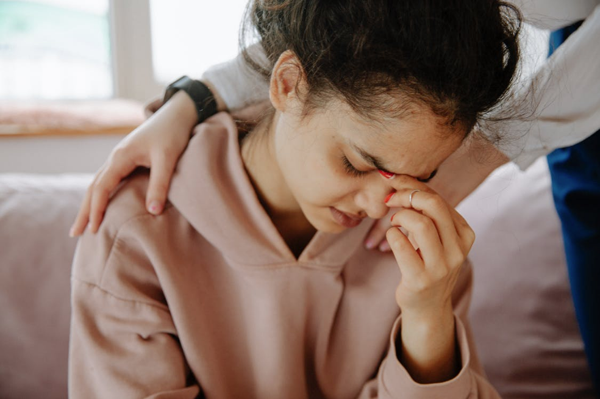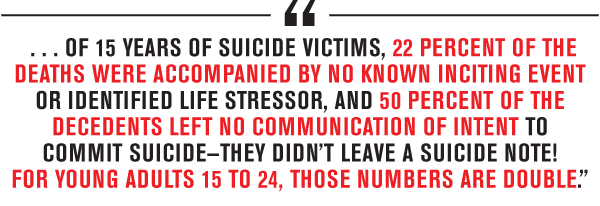
Photo courtesy of Polina Zimmerman / Pexels
“It’s not about battling your past but fighting for your future.”
Suicide—that difficult social issue so few want to even whisper, yet one that so many actually have to face. Never in this country’s history have so many people taken their own life. The ruin of this desperate problem is so very real. The urgency of every family to join together to fight it has never been more important.
Suicide was on the rise in the United States before COVID impacted our country. In fact, suicide rates have been escalating exponentially for the past 12 years. According to the Center for Disease Control and Prevention, suicide has risen by 35 percent in the United States between 1999 and 2018. It is the tenth-leading cause of death in the country, but it is the second leading cause of death for young people age 15 to 24.
Data from the Tennessee Department of Health showed an 11 percent increase from 2015 to 2019. According to this data, 1,220 Tennesseans died by suicide, and within that grim statistic is a dramatic increase among young girls. The suicide rate for people between 10 and 24 rose 15 percent, but for girls in that group the rate was 51 percent! And this was prior to COVID!
One of the things I do nightly is take suicide calls on the National Suicide Helpline (call the helpline at 1-800-273–TALK if you could use someone to talk to). It is not an easy thing to do, but it’s vitally important. Calls are up in some states over 2,000 percent year over year. It’s very sad, and it doesn’t seem to be getting any better. In fact, estimates paint a grim picture of increasing suicide attempts and suicides for years to come, especially among adolescents.
Help lines aren’t a panacea for suicide. They won’t systemically solve the problem. Many people I know who have survived a suicide attempt tell me that even in their darkest moments they would’ve never called a hotline. Many others though, especially young people, are reaching out, and having that number available just got a lot easier this past year, thanks to many dedicated people. I have been part of a campaign more than 10 years in the trenches pushing to change the National Suicide Helpline to a 3-digit number. It was under the Trump Administration that this bi-partisan action came to fruition, and by mid-2022, hopefully sooner in most of Tennessee, that national number will become 988. I cannot emphasize how important this will be, as young people who need to talk will have an easy number to remember. We will be educating tens of millions of kids and families about this change to make sure it’s as well known as 911, because it is an emergency, but a more specific one that needs more specific attention than a 911 dispatcher. I am on some calls for over an hour and a 911 dispatcher couldn’t be expected to give that much time to a person in any level of crisis.

While this National Helpline is vital, and needs to be known by all, it’s just a part of an effort to uniformly reduce lives lost. We need to do this together. Many people are afraid to talk about suicide. One of the top reasons is that people are afraid to say the wrong thing, so they say nothing at all. Family members almost always tell me that there was no sign that their loved one was going to take their life. I respond that there’s often no sign to see. In a University of Iowa in-depth study of 15 years of suicide victims, 22 percent of the deaths were accompanied by no known inciting event or identified life stressor, and 50 percent of the decedents left no communication of intent to commit suicide—they didn’t leave a suicide note! For young adults 15 to 24, those numbers are double. Kids don’t talk about it and they’re more impulsive about it, so there are even fewer notes. This is very troubling for families on top of the pain of the death: parents blaming themselves, asking why and obsessing over shoulda, coulda, woulda . . .
What I can tell you is this—we have to talk to our kids, our young adults, our family and friends more now than ever. We can’t be afraid of saying the wrong thing, we can’t be afraid to talk about the growing elephant in the room. This past year has been full of isolation and loneliness, especially for our young people. Fear, change and loss of connection has all been hard. One of the most important assets students have are their counselors and educators to talk to or lean on with life’s problems They’ve been the “go-to resource” for kids 10 months out of every year of their 12-year educational life. Now, for the past year, that platform has been removed. So who can kids lean on?
Isolation is often a factor in suicides, but it’s not just isolation. People are quick to blame loneliness and a lack of social integration for suicide, but the other factor we tend to overlook is how much people guide you, oversee what you do, give you advice, and tell you when you are screwing up and help you right your path—family and friends regulating the accomplishments in your life. The ability of your family, friends, educators, coaches, even society, to guide you is what’s been taken away more and more since the explosion of social media, but especially for youth and young adults, over the past year. It’s more than just lack of connectedness, it’s loss of life coaching and counseling. This is paramount as we exit the COVID lockdowns and schools return to full in-person learning, and families and communities need to elevate that dimension of involvement in each other.
Helping kids, teens and young adults cope with this transition to more normalcy is very important. The change back for some will be as rocky as the change they went through. Very few people ever even contemplated the difficulties families would face with virtual learning, even fewer are discussing the way back, and it will be very difficult for many young people.
Here is some quick advice that can help when adolescents are finding it hard to cope or are having suicidal thoughts:
– Try not to snap at your teenager. This time is hard on everyone and teens might be dealing with pressures you’re unaware of. Just summon a little extra patience.
– Give teens space, but not too much. Working on things together like journaling would be a good way to review the day and look at tasks for the following day, but hovering and helicoptering at this time is not the answer.
– Help them form a healthy routine. Expectations are more important now than ever and change is hard for everyone. If a virtual normalcy was created for kids, it might be easy to simply expect a return to a normalcy that’s over a year old. That’s not easy for adults, it’s nearly impossible for kids, and they’re dealing with other kids and different stages of stress. The new routine should have family input and crafting, and truly make them part of the solution.
– Create time for family. This next stage for all of our lives is uncharted, and charting this journey as a family will be advantageous. Keep in mind that many kids don’t have that nuclear unit and, as best you can, find trusted adults who can be an extended part of that family time and mapping.
– Encouragement over punishment. Teens don’t like to be told what to do. A great leader once told me if you want kids to do what you want them to do, put the idea in their head and have it come back as their idea. Encourage in a way that they feel it’s their choice. Show them the bigger picture. I know this is easier said than done, but it’s vital to increase their sense of accomplishment once they achieve tasks.
– Check in on your teen’s mental health. Without hovering or pressing too much, regularly see how they’re doing mentally. Look for changes in their mood. Be empathetic and understanding of how much their world is changing and engage them in the understanding of how all of our world’s are changing. Don’t leave them to figure out this new reality entirely on their own
Our success as a country hinges on being successful with our youth. Parents and guardians must lead the way, and Steered Straight has written an in-depth guide and tool to do just that to learn more about this issue. Table Talks and Dashboard Conversations gives parents a year of conversations that they can have with their middle and high school students on a daily basis. There are more than 365 conversations to choose from, published into an easy-to-use, journaling guide, with 12 months of themes and conversations for every day of the year.













